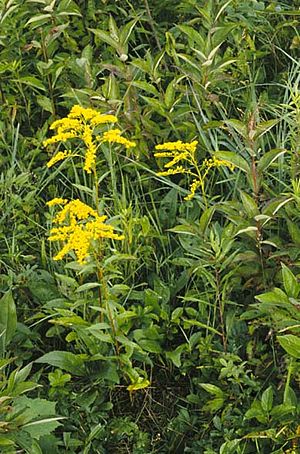Early goldenrod facts for kids
Quick facts for kids Early goldenrod |
|
|---|---|
 |
|
| Scientific classification | |
| Genus: |
Solidago
|
| Species: |
juncea
|
| Synonyms | |
|
Aster ciliaris Kuntze |
|
Solidago juncea, also known as the early goldenrod, plume golden-rod, or yellow top, is a type of plant found in North America. It is a herbaceous perennial plant, meaning it has soft stems (not woody like a tree) and lives for more than two years. This plant belongs to the sunflower family.
Early goldenrod grows naturally across eastern and central Canada and the eastern and central United States. You can find it from Nova Scotia in the east, all the way west to Manitoba and Minnesota. It also grows south into northern Georgia and northern Arkansas. Sometimes, you might even spot a few groups of these plants in Louisiana and Oklahoma.
Discovering Early Goldenrod
Early goldenrod is a plant that can grow quite tall. It can reach up to 120 cm (about 4 feet) high. This plant spreads by using special underground stems called rhizomes. These rhizomes help new plants grow nearby.
What Early Goldenrod Looks Like
The leaves of the early goldenrod are largest near the bottom of the plant. These lower leaves can be as long as 30 cm (about 1 foot). As you look higher up the stem, the leaves become smaller.
One early goldenrod plant can produce many small yellow flowers. It can have as many as 450 tiny flower heads! These flowers grow together in a big, eye-catching cluster.
Where Early Goldenrod Grows
This plant is often grown in gardens. People like to plant it because its bright yellow flowers make gardens look beautiful. It is a popular choice for adding color to outdoor spaces.

